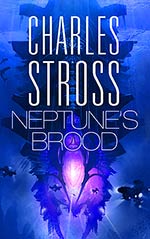
![]() Josef
Josef
10/3/2014
![]()
Charles Stross' Neptune's Brood to put it simply is a good read. At the same time it can be a little more complicated than that. It has few flaws, and well the beginning at times can make the story be a little slow. In the end, it makes it worth the read in the end. One major bonus, which I later discovered, that it is a sequel. I did not know this, and well, I am not sure how the first book played out, let alone if it had the same characters, but it did not feel like a sequel, and you could read it without reading the first.
The story takes place several centuries in the future where humanity is, well, near extinction, it feels like not a lot went into explaining other than the fact there are partially machines now. Krina Alizond-114, the main character, is on a search for a sib, a close relative in a sense of the same colony; it is explained as the story goes.
The story is told in two major parts. The travel there, to the alien planet known as Shin-Tethys, makes the first half, where the second half mostly takes place on the planet, looking for the sib and much later towards the end in space.
The travel there at times can seem like it takes a long time and can seem like the journey is one sided and is only about finding the sib. This however is important, since it introduces a lot of key characters that are important in the later half. It makes it well worth it in the end to say the least, and some are more important than the others.
The second half, after there is a prelude that plays a major turn in the story and the true reason for the journey itself. This redeems the first half and gives more detail on what is really happening. The story switches up and focuses down onto what the journey really is, and without going into spoiler territory deals with money and finances. This helps boost the suspense, and the questioning of what is really going on as more and more pieces that Krina left out about what she is going and why. It is very interesting to the end.
The second half is very well written, but there are still flaws. It is not in terms of plot really. At times when it comes to passing it can seem a bit slow, this is mostly in the first half, but not really at the same time. That is not the main problem. The more of a problem that was found was more of when it came to describing the planets, or the large amounts of information about finances that disrupted the flow of the story. It is important, and there is really no way around the information dump when it came to the finances, which was a major part of the story and required all this information. The descriptions of the planets, and spaceships in some cases, interrupted it by having the main character, Krina telling us, mid-way through a scene to tell us what the area is like. The detail of the places are brilliant, yet, how it interrupted the flow by having Krina or someone else in other cases explain, could have been done in a different way. Then at times it can switch to a different persons' perspective or switch to an earlier without saying, although one can catch on fairly quickly early on in the first half this can catch a person off guard. The flaws do not make an appearance that much, it is just sometimes they can stand out, which can be good in order to understand the situation more, but they do contribute to the story in major ways.
Charles Stross' Neptune's Brood was a good read. For someone who, for starters, did not know it was a sequel, it could be read without reading the one before it. Also as someone who has read more fantasy genre novels then science fiction, it is still worth reading and was enjoyable to the end.